Wednesday, March 26, 2025. Annette’s Roundup for Democracy.
The Trump little boys play war. For real.
War Planning by the Trump regime.
A Mack-Truck-Size Breach.
The Historian Heather Cox Richardson summarized what happened:
[On Monday] the editor-in-chief of The Atlantic, Jeffrey Goldberg, dropped the story that senior members of the Trump administration planned the March 15 U.S. attack on the Houthis in Yemen over Signal, a widely available encrypted app that is most decidedly not part of the United States national security system. The decision to steer around government systems was possibly an attempt to hide conversations, since the app was set to erase some messages after a week and others after four weeks. By law, government communications must be archived.
According to Goldberg, the use of Signal may also have violated the Espionage Act, which establishes how officials must handle information about the national defense. The app is not approved for national security use, and officials are supposed either to discuss military activity in a sensitive compartmented information facility, or SCIF, or to use approved government equipment.
The use of Signal to plan a military attack on Yemen was itself an astonishingly dangerous breach, but what comes next is simply mind-boggling: the reason Goldberg could report on the conversation is that the person setting it up included Goldberg—a reporter without security clearance—in it.
Goldberg reports that on March 11 he received a connection request from someone named Michael Waltz, although he did not believe the actual Michael Waltz, who is Trump’s national security advisor, would be writing to him. He thought it was likely someone trying to entrap him, although he thought perhaps it could be the real Waltz with some information. Two days later, he was included in the “Houthi PC small group,” along with a message that the chat would be for “a principles [sic] group for coordination on Houthis.”
As Goldberg reports, a “principals committee generally refers to a group of the senior-most national-security officials, including the secretaries of defense, state, and the treasury, as well as the director of the CIA. It should go without saying—but I’ll say it anyway—that I have never been invited to a White House principals-committee meeting, and that, in my many years of reporting on national-security matters, I had never heard of one being convened over a commercial messaging app.”
The other names on the app were those of Secretary of State Marco Rubio, Vice President J.D. Vance, Director of National Intelligence Tulsi Gabbard, Treasury Secretary Scott Bessent, Secretary of Defense Pete Hegseth, Brian McCormack from the National Security Council, Central Intelligence Director John Ratcliffe, Trump’s Middle East and Ukraine negotiator Steve Witkoff, White House chief of staff Suzy Wiles, perhaps White House deputy chief of staff Stephen Miller, and Trump’s nominee for head of the National Counterterrorism Center, Joe Kent.
Goldberg assumed the chat was fake, some sort of disinformation campaign, although he was concerned when Ratcliffe provided the full name of a CIA operative in this unsecure channel. But on March 14, as Vance, for example, took a strong stand against Europe—“I just hate bailing Europe out again”—and as Hegseth emphasized that their messaging must be that “Biden failed,” Goldberg started to think the chat might be real. Those in the chat talked of finding a way to make Europe pay the costs for the U.S. attack, and of “minimiz[ing] risk to Saudi oil facilities.”
And then, on March 15, the messages told of the forthcoming attack. “I will not quote from this update, or from certain other subsequent texts,” Goldberg writes. “The information contained in them, if they had been read by an adversary of the United States, could conceivably have been used to harm American military and intelligence personnel, particularly in the broader Middle East, Central Command’s area of responsibility. What I will say, in order to illustrate the shocking recklessness of this Signal conversation, is that the Hegseth post contained operational details of forthcoming strikes on Yemen, including information about targets, weapons the U.S. would be deploying, and attack sequencing.” (Letters from an American)
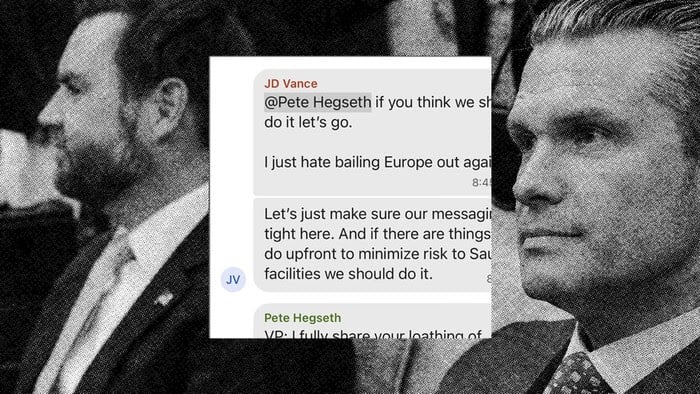
David A. Graham: Has anything like this ever happened to you before?
Jeffrey Goldberg: I think that on one level, this is very relatable. Everyone has sent a text or an email to an unintended recipient, and sometimes they’ve embarrassed themselves by doing that. This is, I would say, at a different level—but it kind of proves a point, which is that there’s a reason people who work on sensitive issues in the government aren’t supposed to use Signal, even though it is end-to-end encrypted. Anyone can use Signal, so if you’re not careful, you might pull into your conversation a Houthi sympathizer or a magazine editor.
Our colleague Shane Harris points out that the phones of top senior defense and national-security and intelligence officials are targets of intelligence operations. Imagine what you can do if you saw everything that the CIA director may be texting, even on a secure phone—especially on a secure phone. I’m mindful of the fact that the Trump team has already dealt with a serious issue in the securing of sensitive documents in Mar-a-Lago. If you’re going to make a big deal about Hillary Clinton’s emails, you may want to have excellent communication hygiene.
David: Tell me how you came to conclude that this group was real.
Jeffrey: It was actually chilling: 11:44 a.m., Saturday the 15th, Eastern Time, in my car in a parking lot, just checking my phone, and I see a text from Pete Hegseth, or somebody who’s hoaxing me as Pete Hegseth. It provides information about upcoming military operations with timings attached: This is going to happen. Then this happens, then this happens, and this happens. I’m sitting there in my car and thinking I’m about to find out if this was an elaborate scam or not. So I thought to myself, I’m sitting here for the next two hours with my hands around my phone. I check on X around 1:55, and yes, Sanaa is being bombed, so then I have the realization that this is almost certainly a real channel and not just an elaborate fakery of some sort. And that’s when I began to realize that I had to write about this massive security breach.
David: You have done a lot of sensitive national-security reporting. Have you ever received any information like this?
Jeffrey: No, nothing like this. This was like an intravenous drip of information that no one in the government thinks journalists should have. Until almost the very last minute, I could not believe that this was actually happening, that there could be a Mack-truck-size breach, that somehow, the editor in chief of The Atlantic was invited into a conversation with the intelligence agencies, secretaries, the national security adviser. Like most reporters, I’ve been a recipient of leaks. A leak is a totally different thing. That’s a whistleblower trying to make complaints. This is just reckless.
David: There’s the horror that something like this would happen on an operational level, but in terms of what we learn from the substance of the conversation, what are the most important things that people should take away?
Jeffrey: The actual conversation that they have is fascinating, and in a certain way impressive. It’s nice to see that they’re disagreeing with one another. It’s very useful for the public to know that the vice president has a more hands-off approach than other members of the administration. One of the things that I found interesting was that when a person named “S M” in the chat, who I took to be Stephen Miller, comes in and says, “As I heard it, the president was clear,” this kind of shuts down the conversation. It suggests that Stephen Miller can be in a conversation with, among others, the vice president of the United States and still can get his way. (Miller did not reply to a request for comment or confirm that he is “S M.”)
David: In addition to the question of how secure Signal is, this is also notable, because without this report, none of these conversations might be preserved for posterity. You note that National Security Adviser Michael Waltz set some messages to disappear after a week or so.
Jeffrey: This is an interesting question: Are they using Signal because it’s convenient? Are they using Signal because it disappears? According to the experts Shane interviewed, the administration should not have established a Signal thread for such conversations in the first place, but once it did, what one is supposed to do legally is copy an official government account, and that government account will then send these threads to the National Archives for posterity, for research, for accountability. But if you’re using a disappearing-text app, I don’t know. That’s one of the questions that I’ve asked and have not gotten answered yet.
David: It is remarkable that this would happen with any reporter. It’s even more remarkable that this would happen with someone like you, and with a publication that has been specifically singled out by the president. Do you have any sense of how this happened?
Jeffrey: I literally have no idea. The remarkable thing is that no one in the group asked, Who’s JG?, and when I removed myself from the group, seemingly nobody said, Hey, why did JG leave?
David: Are you concerned about retaliation from the Trump administration because of this story?
Jeffrey: It’s not my role to care about the possibility of threats or retaliation. We just have to come to work and do our jobs to the best of our ability. Unfortunately, in our society today—we see this across corporate journalism and law firms and other industries—there’s too much preemptive obeying for my taste. All we can do is just go do our jobs.
Now the full article from Jeffrey Goldberg in the Atlantic.
The Trump Administration Accidentally Texted Me Its War Plans.
U.S. national-security leaders included me in a group chat about upcoming military strikes in Yemen. I didn’t think it could be real. Then the bombs started falling. (

The world found out shortly before 2 p.m. eastern time on March 15 that the United States was bombing Houthi targets across Yemen.
I, however, knew two hours before the first bombs exploded that the attack might be coming. The reason I knew this is that Pete Hegseth, the secretary of defense, had texted me the war plan at 11:44 a.m. The plan included precise information about weapons packages, targets, and timing.
This is going to require some explaining.
The story technically begins shortly after the Hamas invasion of southern Israel, in October 2023. The Houthis—an Iran-backed terrorist organization whose motto is “God is great, death to America, death to Israel, curse on the Jews, victory to Islam”—soon launched attacks on Israel and on international shipping, creating havoc for global trade. Throughout 2024, the Biden administration was ineffective in countering these Houthi attacks; the incoming Trump administration promised a tougher response.
This is where Pete Hegseth and I come in.
On Tuesday, March 11, I received a connection request on Signal from a user identified as Michael Waltz. Signal is an open-source encrypted messaging service popular with journalists and others who seek more privacy than other text-messaging services are capable of delivering. I assumed that the Michael Waltz in question was President Donald Trump’s national security adviser. I did not assume, however, that the request was from the actual Michael Waltz. I have met him in the past, and though I didn’t find it particularly strange that he might be reaching out to me, I did think it somewhat unusual, given the Trump administration’s contentious relationship with journalists—and Trump’s periodic fixation on me specifically. It immediately crossed my mind that someone could be masquerading as Waltz in order to somehow entrap me. It is not at all uncommon these days for nefarious actors to try to induce journalists to share information that could be used against them.
I accepted the connection request, hoping that this was the actual national security adviser, and that he wanted to chat about Ukraine, or Iran, or some other important matter.
Two days later—Thursday—at 4:28 p.m., I received a notice that I was to be included in a Signal chat group. It was called the “Houthi PC small group.”
A message to the group, from “Michael Waltz,” read as follows: “Team – establishing a principles [sic] group for coordination on Houthis, particularly for over the next 72 hours. My deputy Alex Wong is pulling together a tiger team at deputies/agency Chief of Staff level following up from the meeting in the Sit Room this morning for action items and will be sending that out later this evening.”
The message continued, “Pls provide the best staff POC from your team for us to coordinate with over the next couple days and over the weekend. Thx.”
The term principals committee generally refers to a group of the senior-most national-security officials, including the secretaries of defense, state, and the treasury, as well as the director of the CIA. It should go without saying—but I’ll say it anyway—that I have never been invited to a White House principals-committee meeting, and that, in my many years of reporting on national-security matters, I had never heard of one being convened over a commercial messaging app.
One minute later, a person identified only as “MAR”—the secretary of state is Marco Antonio Rubio—wrote, “Mike Needham for State,” apparently designating the current counselor of the State Department as his representative. At that same moment, a Signal user identified as “JD Vance” wrote, “Andy baker for VP.” One minute after that, “TG” (presumably Tulsi Gabbard, the director of national intelligence, or someone masquerading as her) wrote, “Joe Kent for DNI.” Nine minutes later, “Scott B”—apparently Treasury Secretary Scott Bessent, or someone spoofing his identity, wrote, “Dan Katz for Treasury.” At 4:53 p.m., a user called “Pete Hegseth” wrote, “Dan Caldwell for DoD.” And at 6:34 p.m., “Brian” wrote “Brian McCormack for NSC.” One more person responded: “John Ratcliffe” wrote at 5:24 p.m. with the name of a CIA official to be included in the group. I am not publishing that name, because that person is an active intelligence officer.
The principals had apparently assembled. In all, 18 individuals were listed as members of this group, including various National Security Council officials; Steve Witkoff, President Trump’s Middle East and Ukraine negotiator; Susie Wiles, the White House chief of staff; and someone identified only as “S M,” which I took to stand for Stephen Miller. I appeared on my own screen only as “JG.”
That was the end of the Thursday text chain.
After receiving the Waltz text related to the “Houthi PC small group,” I consulted a number of colleagues. We discussed the possibility that these texts were part of a disinformation campaign, initiated by either a foreign intelligence service or, more likely, a media-gadfly organization, the sort of group that attempts to place journalists in embarrassing positions, and sometimes succeeds. I had very strong doubts that this text group was real, because I could not believe that the national-security leadership of the United States would communicate on Signal about imminent war plans. I also could not believe that the national security adviser to the president would be so reckless as to include the editor in chief of The Atlantic in such discussions with senior U.S. officials, up to and including the vice president.
The next day, things got even stranger.
At 8:05 a.m. on Friday, March 14, “Michael Waltz” texted the group: “Team, you should have a statement of conclusions with taskings per the Presidents guidance this morning in your high side inboxes.” (High side, in government parlance, refers to classified computer and communications systems.) “State and DOD, we developed suggested notification lists for regional Allies and partners. Joint Staff is sending this am a more specific sequence of events in the coming days and we will work w DOD to ensure COS, OVP and POTUS are briefed.”
At this point, a fascinating policy discussion commenced. The account labeled “JD Vance” responded at 8:16: “Team, I am out for the day doing an economic event in Michigan. But I think we are making a mistake.” (Vance was indeed in Michigan that day.) The Vance account goes on to state, “3 percent of US trade runs through the suez. 40 percent of European trade does. There is a real risk that the public doesn’t understand this or why it’s necessary. The strongest reason to do this is, as POTUS said, to send a message.”
The Vance account then goes on to make a noteworthy statement, considering that the vice president has not deviated publicly from Trump’s position on virtually any issue. “I am not sure the president is aware how inconsistent this is with his message on Europe right now. There’s a further risk that we see a moderate to severe spike in oil prices. I am willing to support the consensus of the team and keep these concerns to myself. But there is a strong argument for delaying this a month, doing the messaging work on why this matters, seeing where the economy is, etc.”
A person identified in Signal as “Joe Kent” (Trump’s nominee to run the National Counterterrorism Center is named Joe Kent) wrote at 8:22, “There is nothing time sensitive driving the time line. We’ll have the exact same options in a month.”
Then, at 8:26 a.m., a message landed in my Signal app from the user “John Ratcliffe.” The message contained information that might be interpreted as related to actual and current intelligence operations.
At 8:27, a message arrived from the “Pete Hegseth” account. “VP: I understand your concerns – and fully support you raising w/ POTUS. Important considerations, most of which are tough to know how they play out (economy, Ukraine peace, Gaza, etc). I think messaging is going to be tough no matter what – nobody knows who the Houthis are – which is why we would need to stay focused on: 1) Biden failed & 2) Iran funded.”
The Hegseth message goes on to state, “Waiting a few weeks or a month does not fundamentally change the calculus. 2 immediate risks on waiting: 1) this leaks, and we look indecisive; 2) Israel takes an action first – or Gaza cease fire falls apart – and we don’t get to start this on our own terms. We can manage both. We are prepared to execute, and if I had final go or no go vote, I believe we should. This [is] not about the Houthis. I see it as two things: 1) Restoring Freedom of Navigation, a core national interest; and 2) Reestablish deterrence, which Biden cratered. But, we can easily pause. And if we do, I will do all we can to enforce 100% OPSEC”—operations security. “I welcome other thoughts.”
A few minutes later, the “Michael Waltz” account posted a lengthy note about trade figures, and the limited capabilities of European navies. “Whether it’s now or several weeks from now, it will have to be the United States that reopens these shipping lanes. Per the president’s request we are working with DOD and State to determine how to compile the cost associated and levy them on the Europeans.”
The account identified as “JD Vance” addressed a message at 8:45 to @Pete Hegseth: “if you think we should do it let’s go. I just hate bailing Europe out again.” (The administration has argued that America’s European allies benefit economically from the U.S. Navy’s protection of international shipping lanes.)
The user identified as Hegseth responded three minutes later: “VP: I fully share your loathing of European free-loading. It’s PATHETIC. But Mike is correct, we are the only ones on the planet (on our side of the ledger) who can do this. Nobody else even close. Question is timing. I feel like now is as good a time as any, given POTUS directive to reopen shipping lanes. I think we should go; but POTUS still retains 24 hours of decision space.”
At this point, the previously silent “S M” joined the conversation. “As I heard it, the president was clear: green light, but we soon make clear to Egypt and Europe what we expect in return. We also need to figure out how to enforce such a requirement. EG, if Europe doesn’t remunerate, then what? If the US successfully restores freedom of navigation at great cost there needs to be some further economic gain extracted in return.”
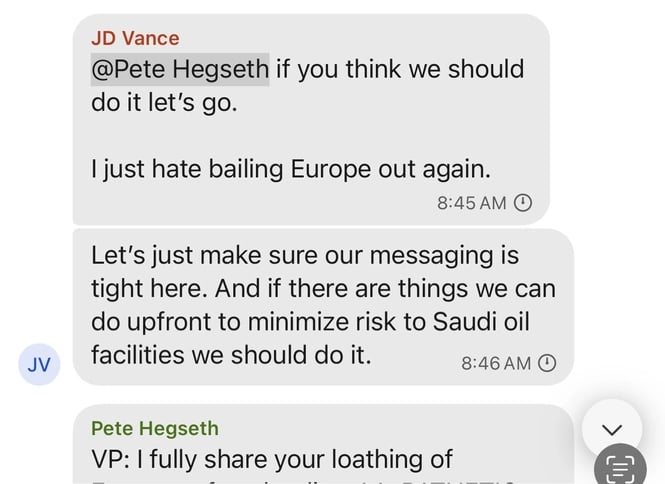
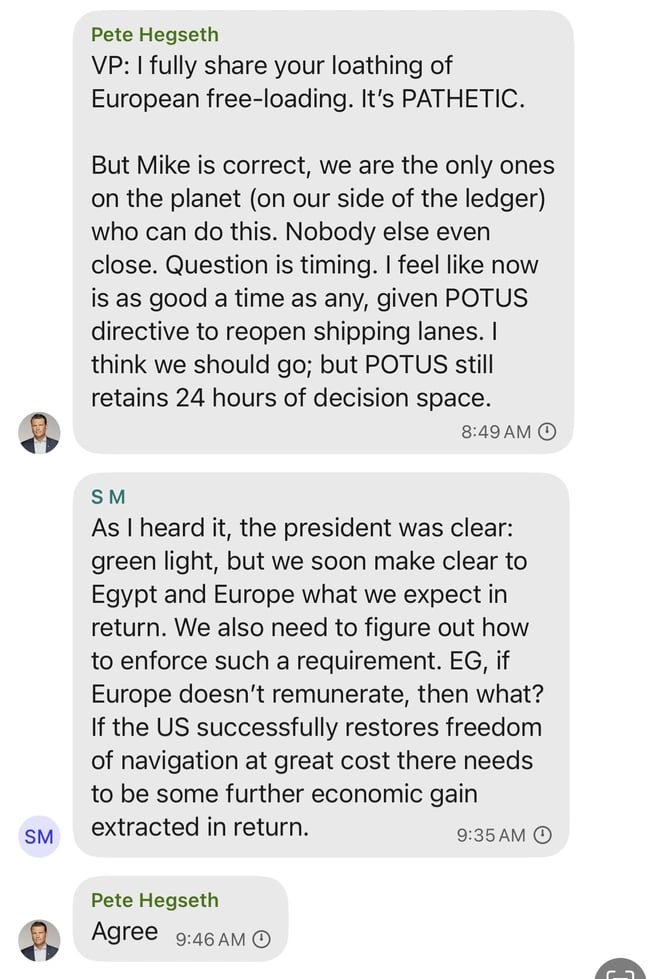
A screenshot from the Signal group shows debate over the president’s views ahead of the attack.
That message from “S M”—presumably President Trump’s confidant Stephen Miller, the deputy White House chief of staff, or someone playing Stephen Miller—effectively shut down the conversation. The last text of the day came from “Pete Hegseth,” who wrote at 9:46 a.m., “Agree.”
After reading this chain, I recognized that this conversation possessed a high degree of verisimilitude. The texts, in their word choice and arguments, sounded as if they were written by the people who purportedly sent them, or by a particularly adept AI text generator. I was still concerned that this could be a disinformation operation, or a simulation of some sort. And I remained mystified that no one in the group seemed to have noticed my presence. But if it was a hoax, the quality of mimicry and the level of foreign-policy insight were impressive.
It was the next morning, Saturday, March 15, when this story became truly bizarre.
At 11:44 a.m., the account labeled “Pete Hegseth” posted in Signal a “TEAM UPDATE.” I will not quote from this update, or from certain other subsequent texts. The information contained in them, if they had been read by an adversary of the United States, could conceivably have been used to harm American military and intelligence personnel, particularly in the broader Middle East, Central Command’s area of responsibility. What I will say, in order to illustrate the shocking recklessness of this Signal conversation, is that the Hegseth post contained operational details of forthcoming strikes on Yemen, including information about targets, weapons the U.S. would be deploying, and attack sequencing.
The only person to reply to the update from Hegseth was the person identified as the vice president. “I will say a prayer for victory,” Vance wrote. (Two other users subsequently added prayer emoji.)
According to the lengthy Hegseth text, the first detonations in Yemen would be felt two hours hence, at 1:45 p.m. eastern time. So I waited in my car in a supermarket parking lot. If this Signal chat was real, I reasoned, Houthi targets would soon be bombed. At about 1:55, I checked X and searched Yemen. Explosions were then being heard across Sanaa, the capital city.
I went back to the Signal channel. At 1:48, “Michael Waltz” had provided the group an update. Again, I won’t quote from this text, except to note that he described the operation as an “amazing job.” A few minutes later, “John Ratcliffe” wrote, “A good start.” Not long after, Waltz responded with three emoji: a fist, an American flag, and fire. Others soon joined in, including “MAR,” who wrote, “Good Job Pete and your team!!,” and “Susie Wiles,” who texted, “Kudos to all – most particularly those in theater and CENTCOM! Really great. God bless.” “Steve Witkoff” responded with five emoji: two hands-praying, a flexed bicep, and two American flags. “TG” responded, “Great work and effects!”
The after-action discussion included assessments of damage done, including the likely death of a specific individual. The Houthi-run Yemeni health ministry reported that at least 53 people were killed in the strikes, a number that has not been independently verified.
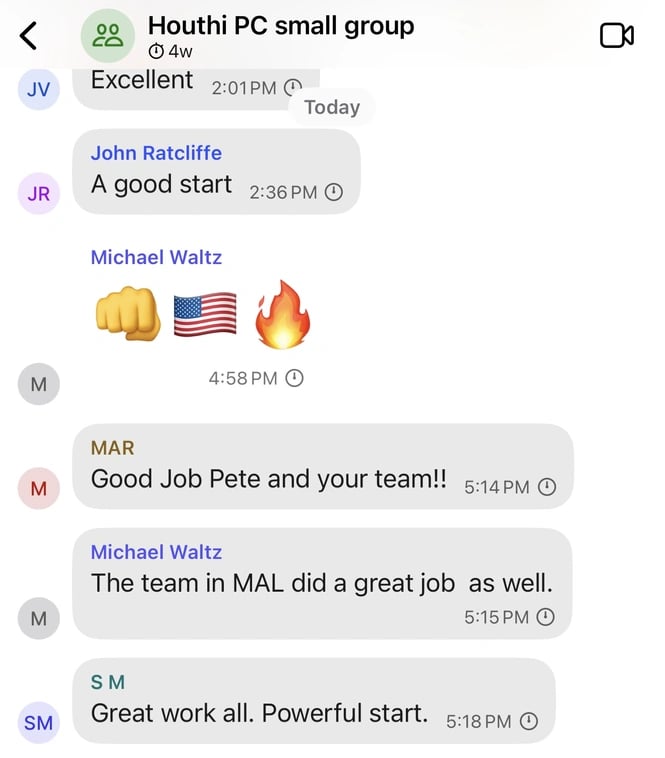
A screenshot from the Signal group shows reactions to the strikes.
On Sunday, Waltz appeared on ABC’s This Week and contrasted the strikes with the Biden administration’s more hesitant approach. “These were not kind of pinprick, back-and-forth—what ultimately proved to be feckless attacks,” he said. “This was an overwhelming response that actually targeted multiple Houthi leaders and took them out.”
The Signal chat group, I concluded, was almost certainly real. Having come to this realization, one that seemed nearly impossible only hours before, I removed myself from the Signal group, understanding that this would trigger an automatic notification to the group’s creator, “Michael Waltz,” that I had left. No one in the chat had seemed to notice that I was there. And I received no subsequent questions about why I left—or, more to the point, who I was.
Earlier today, I emailed Waltz and sent him a message on his Signal account. I also wrote to Pete Hegseth, John Ratcliffe, Tulsi Gabbard, and other officials. In an email, I outlined some of my questions: Is the “Houthi PC small group” a genuine Signal thread? Did they know that I was included in this group? Was I (on the off chance) included on purpose? If not, who did they think I was? Did anyone realize who I was when I was added, or when I removed myself from the group? Do senior Trump-administration officials use Signal regularly for sensitive discussions? Do the officials believe that the use of such a channel could endanger American personnel?
Brian Hughes, the spokesman for the National Security Council, responded two hours later, confirming the veracity of the Signal group. “This appears to be an authentic message chain, and we are reviewing how an inadvertent number was added to the chain,” Hughes wrote. “The thread is a demonstration of the deep and thoughtful policy coordination between senior officials. The ongoing success of the Houthi operation demonstrates that there were no threats to troops or national security.”
William Martin, a spokesperson for Vance, said that despite the impression created by the texts, the vice president is fully aligned with the president. “The Vice President’s first priority is always making sure that the President’s advisers are adequately briefing him on the substance of their internal deliberations,” he said. “Vice President Vance unequivocally supports this administration’s foreign policy. The President and the Vice President have had subsequent conversations about this matter and are in complete agreement.”
I have never seen a breach quite like this. It is not uncommon for national-security officials to communicate on Signal. But the app is used primarily for meeting planning and other logistical matters—not for detailed and highly confidential discussions of a pending military action. And, of course, I’ve never heard of an instance in which a journalist has been invited to such a discussion.
Conceivably, Waltz, by coordinating a national-security-related action over Signal, may have violated several provisions of the Espionage Act, which governs the handling of “national defense” information, according to several national-security lawyers interviewed by my colleague Shane Harris for this story. Harris asked them to consider a hypothetical scenario in which a senior U.S. official creates a Signal thread for the express purpose of sharing information with Cabinet officials about an active military operation. He did not show them the actual Signal messages or tell them specifically what had occurred.
All of these lawyers said that a U.S. official should not establish a Signal thread in the first place. Information about an active operation would presumably fit the law’s definition of “national defense” information. The Signal app is not approved by the government for sharing classified information. The government has its own systems for that purpose. If officials want to discuss military activity, they should go into a specially designed space known as a sensitive compartmented information facility, or SCIF—most Cabinet-level national-security officials have one installed in their home—or communicate only on approved government equipment, the lawyers said. Normally, cellphones are not permitted inside a SCIF, which suggests that as these officials were sharing information about an active military operation, they could have been moving around in public. Had they lost their phones, or had they been stolen, the potential risk to national security would have been severe.
Hegseth, Ratcliffe, and other Cabinet-level officials presumably would have the authority to declassify information, and several of the national-security lawyers noted that the hypothetical officials on the Signal chain might claim that they had declassified the information they shared. But this argument rings hollow, they cautioned, because Signal is not an authorized venue for sharing information of such a sensitive nature, regardless of whether it has been stamped “top secret” or not.
There was another potential problem: Waltz set some of the messages in the Signal group to disappear after one week, and some after four. That raises questions about whether the officials may have violated federal records law: Text messages about official acts are considered records that should be preserved.
“Under the records laws applicable to the White House and federal agencies, all government employees are prohibited from using electronic-messaging applications such as Signal for official business, unless those messages are promptly forwarded or copied to an official government account,” Jason R. Baron, a professor at the University of Maryland and the former director of litigation at the National Archives and Records Administration, told Harris.
“Intentional violations of these requirements are a basis for disciplinary action. Additionally, agencies such as the Department of Defense restrict electronic messaging containing classified information to classified government networks and/or networks with government-approved encrypted features,” Baron said.
Several former U.S. officials told Harris and me that they had used Signal to share unclassified information and to discuss routine matters, particularly when traveling overseas without access to U.S. government systems. But they knew never to share classified or sensitive information on the app, because their phones could have been hacked by a foreign intelligence service, which would have been able to read the messages on the devices. It is worth noting that Donald Trump, as a candidate for president (and as president), repeatedly and vociferously demanded that Hillary Clinton be imprisoned for using a private email server for official business when she was secretary of state. (It is also worth noting that Trump was indicted in 2023 for mishandling classified documents, but the charges were dropped after his election.)
Waltz and the other Cabinet-level officials were already potentially violating government policy and the law simply by texting one another about the operation. But when Waltz added a journalist—presumably by mistake—to his principals committee, he created new security and legal issues. Now the group was transmitting information to someone not authorized to receive it. That is the classic definition of a leak, even if it was unintentional, and even if the recipient of the leak did not actually believe it was a leak until Yemen came under American attack.
All along, members of the Signal group were aware of the need for secrecy and operations security. In his text detailing aspects of the forthcoming attack on Houthi targets, Hegseth wrote to the group—which, at the time, included me—“We are currently clean on OPSEC.”

Jeffrey Goldberg is the editor in chief of The Atlantic and the moderator of Washington Week With The Atlantic.
From Heather Cox Richardson. Letters from an American.
When asked about the breach, Trump responded: “I don't know anything about it. I'm not a big fan of The Atlantic. To me, it's a magazine that's going out of business. I think it’s not much of a magazine. But I know nothing about it. You're saying that they had what?”
There is nothing that the administration could say to make the situation better, but this made it worse. As national security specialist Tom Nichols noted: “If the President is telling the truth and no one’s briefed him about this yet, that’s another story in itself. In any other administration, [the chief of staff] would have been in the Oval [Office] within nanoseconds of learning about something like this.”
——-
Zachary B. Wolf of CNN noted that “Trump intentionally hired amateurs for top jobs. This is their most dramatic blunder.” Senator Jon Ossoff (D-GA) told Brian Tyler Cohen: “My first reaction... was 'what absolute clowns.' Total amateur hour, reckless, dangerous…. [T]his is what happens when you have basically Fox News personalities cosplaying as government officials.” Foreign policy scholar Timothy Snyder posted: “These guys inherited one of the most functional state apparatus in the history of the world and they are inhabiting it like a crack house.”
Today, for her part, Clinton posted a link to the story along with an eyes emoji and wrote: “You have got to be kidding.”
Later she included this.👇

As Democrats Call for Resignations, Republicans React More Tepidly to Leaked Trump Officials’ War Plans Group Chat.
A bombshell report that top national security officials for President Donald Trump discussed war plans in a private group chat that accidentally included the editor-in-chief of the Atlantic has elicited fierce criticism from Democrats and media commentators who have framed it as a scandal for which heads should roll—but it’s largely been dismissed by a number of Republicans.
In a story published on Monday, journalist Jeffrey Goldberg revealed that National Security Advisor Mike Waltz added him last month to a group chat on Signal, an encrypted messaging app, that also included Defense Secretary Pete Hegseth, Secretary of State Marco Rubio, Treasury Secretary Scott Bessent, Director of National Intelligence Tulsi Gabbard, CIA Director John Ratcliffe, Vice President J.D. Vance, and other top national security and White House officials. In the chat, the officials deliberated over an attack on the Houthis in Yemen and Hegseth sent operational details of strikes two hours before bombs dropped.
Advertisement
Hegseth has suggested the story is fake, calling Goldberg a “deceitful and highly-discredited ‘so-called journalist.’” But National Security Council spokesperson Brian Hughes confirmed to Goldberg that the messages “appears to be authentic” and the administration is “reviewing how an inadvertent number was added to the chain.”
When asked about the report on Monday, Trump said “I don’t know anything about it. I’m not a big fan of the Atlantic.” While Politico reported that some in the administration are furious with Waltz and deliberating whether he should resign or be forced out, White House Press Secretary Karoline Leavitt said Monday that Trump still has “the utmost confidence in his national security team.” The Atlantic report comes days after the Department of Defense announced an investigation into leaks of sensitive information.
The revelation of the leaked group chat set off a flurry of criticism from Democrats, including calls for consequences.
DNC Chair Ken Martin said in a statement that Hegseth should resign or be fired: “Hegseth—and everyone else involved—put on a stunning display of recklessness and disregard for our national security,” Martin said.
“This is one of the most stunning breaches of military intelligence I have read about in a very, very long time,” said Senate Minority Leader Chuck Schumer in a floor speech. Former Transportation Secretary Pete Buttigieg called it the “highest level of f--kup imaginable” in a post on X. “Wait. Pete Hegseth hasn’t resigned yet?” posted California Rep. Eric Swalwell. Illinois Sen. Tammy Duckworth posted that Hegseth “should be fired immediately.” In a statement posted on Threads, Illinois Rep. Jonathan Jackson also called for Hegseth’s resignation, adding that the incident is evidence of the Trump Administration prioritizing “ideological attacks over competence and accountability.”
New York Times columnist David French, a former Army lawyer and self-described evangelical conservative who is a frequent critic of Trump, wrote: “There is not an officer alive whose career would survive a security breach like that.” French suggested that the breach, if committed by another officer, could even be investigated as potentially criminal and that “Nothing destroys a leader’s credibility with soldiers more thoroughly than hypocrisy or double standards. … If [Hegseth] had any honor at all, he would resign.”
But some Republicans in Congress, which is meant to act as a check on and exercise oversight of the executive branch, have largely downplayed the incident, offering mild criticism if any.
“A mistake was made. It happens,” Louisiana Sen. John Kennedy told reporters, adding that it’s “not keeping the American people up at night. … Trust me, this is not going to lead to the apocalypse.” Missouri Sen. Josh Hawley said on Fox News: “This is what the leftist media is reduced to ... now we’re griping about who’s on a text message and who’s not. I mean, come on.” North Carolina Sen. Thom Tillis said, “You got to know who you’re sending your text to,” but he also told reporters “it’s a 24-hour news cycle. … I’ve got a lot of confidence in Mike [Waltz]. This doesn’t undermine my belief that he’s a solid pick for the role.” Florida Sen. Rick Scott expressed similarly tepid concerns: “Clearly, they’ve got to, you know, make sure that they’re careful how they do this,” he told reporters when asked about the group chat.
West Virginia Sen. Shelley Moore Capito said the incident warranted “some kind of internal investigation” to “make corrections,” but Alabama Sen. Tommy Tuberville said a congressional investigation wasn’t needed: “You can’t put just blame on just one person, other than the fact that the person in charge, that the Secretary of Defense Pete Hegseth, he’ll get it corrected. And you know, that’s just part of transition and growing,” Tuberville told CNN.
Florida Rep. Brian Mast, who chairs the House Foreign Affairs Committee, seemed to echo Tuberville’s sentiment, telling reporters that the issue “wasn’t a systemic thing” and didn’t require a “special investigation.”
South Dakota Sen. Mike Rounds added that he expected Democrats to raise the incident during an intelligence hearing on Tuesday, and that “some of my Republican colleagues may raise it just as an issue to be very concerned about.” Gabbard and Ratcliffe are among those who were already due to testify before the Senate Intelligence Committee on Tuesday.
West Virginia Sen. Shelley Moore Capito said the incident warranted “some kind of internal investigation” to “make corrections,” but Alabama Sen. Tommy Tuberville said a congressional investigation wasn’t needed: “You can’t put just blame on just one person, other than the fact that the person in charge, that the Secretary of Defense Pete Hegseth, he’ll get it corrected. And you know, that’s just part of transition and growing,” Tuberville told CNN.
Florida Rep. Brian Mast, who chairs the House Foreign Affairs Committee, seemed to echo Tuberville’s sentiment, telling reporters that the issue “wasn’t a systemic thing” and didn’t require a “special investigation.”
South Dakota Sen. Mike Rounds added that he expected Democrats to raise the incident during an intelligence hearing on Tuesday, and that “some of my Republican colleagues may raise it just as an issue to be very concerned about.” Gabbard and Ratcliffe are among those who were already due to testify before the Senate Intelligence Committee on Tuesday.
House Speaker Mike Johnson told reporters it was an issue of “systems and process, not personnel,” suggesting that disciplinary action against anyone involved in the chat would be the wrong move. “The administration is addressing what happened,” Johnson said. “Apparently an inadvertent phone number made it onto that thread. They’re gonna track that down and make sure that doesn’t happen again. … Clearly, I think the administration has acknowledged it was a mistake and they’ll tighten up and make sure it doesn’t happen again.”
Still, the breach seems to have shaken up many others in the party.
Nebraska Rep. Don Bacon spelled out the national security implications of the gaffe, telling reporters, “everybody makes mistakes, texting somebody, we’ve all done it. But you don’t put classified information on unclassified devices like Signal. And there’s no doubt, I’m an intelligence guy, Russia and China are monitoring both their phones, right. So putting out classified information like that endangers our forces, and I can’t believe that they were knowingly putting that kind of classified information on unclassified systems, it’s just wrong.” Texas Sen. John Cornyn said it “sounds like a huge screw up. I mean is there any other way to describe it? I don’t think you should use Signal for classified information.” And New York Rep. Mike Lawler posted on X: “Classified information should not be transmitted on unsecured channels—and certainly not to those without security clearances, including reporters. Period.”
“We’re just finding out about it. But obviously, we’ve got to run it to ground and figure out what went on there. We’ll have a plan,” said Senate Majority Leader John Thune. Mississippi Sen. Roger Wicker, who chairs the Senate Armed Services Committee, told reporters the committee “will be looking into this.” “It’s definitely a concern, and it appears that mistakes were made,” Wicker added, but he said that whether someone should be held accountable depended on the results of an investigation.
Meanwhile, Maine Sen. Susan Collins reportedly called the incident an “extremely troubling and serious matter”; Alaska Sen. Lisa Murkowski told a HuffPost reporter, “there needs to be some accountability”; and Montana Sen. Tim Sheehy put it most bluntly: “Well, somebody f--ked up.” (Time)
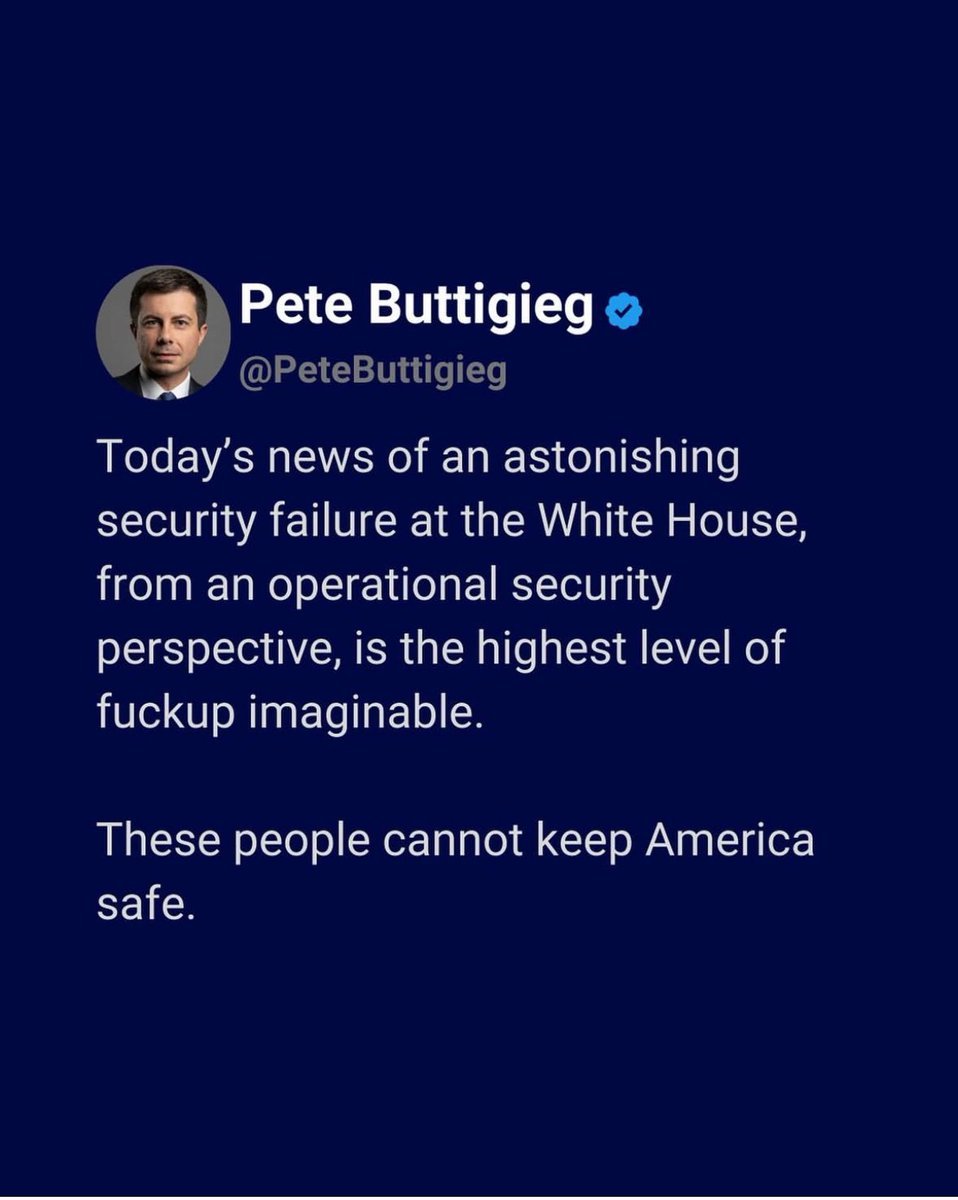
One more thing.
Don’t let the conversation about this dangerous security breach die down.
Republicans, who made Hillary’s emails a security crisis, want to say this breach was nothing.
Post about it again and again, on social media, in letters to the editor, and call your Elected Officials.
Remind everyone.
BREAKING: American Oversight is suing Pete Hegseth, Tulsi Gabbard, John Ratcliffe and others, saying their messaging on the Signal app is a violation of the Federal Records Act. pic.twitter.com/tRBlowfx1K
— Ed Krassenstein (@EdKrassen) March 25, 2025
Your new favorite slogan.
Trumpers Break the Law and Make America Unsafe. Always Remember the Signal Leak.
Use this image.
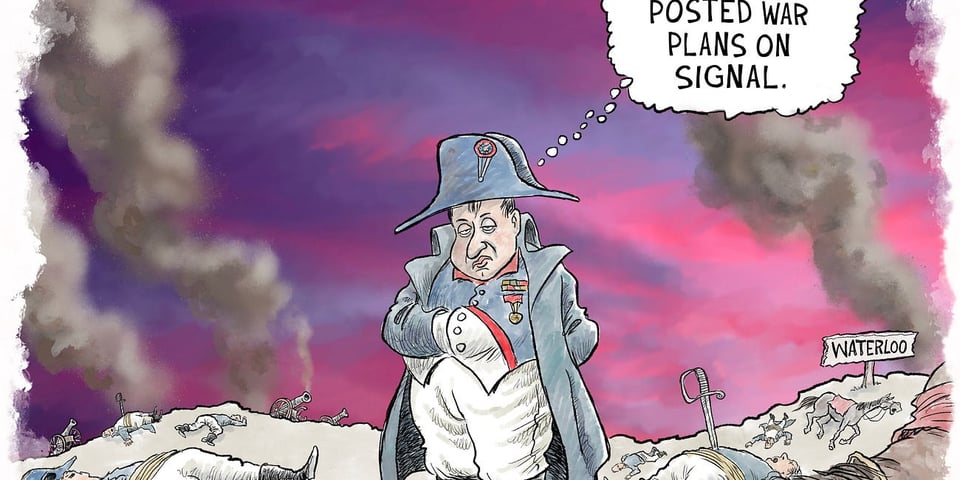
Or the image Hillary chose.

Or this.
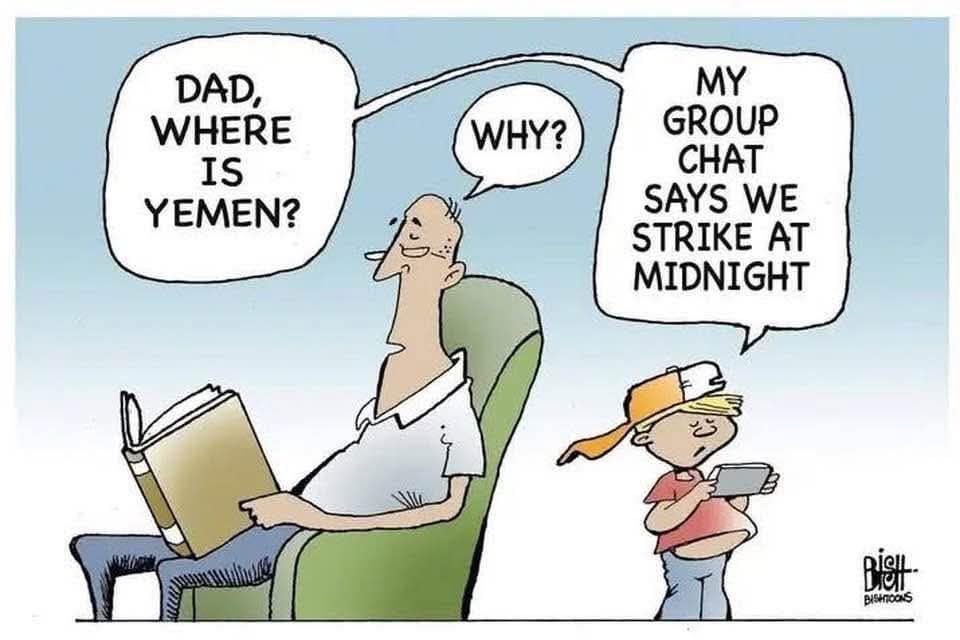
Your daily reminder.
The Supreme Court election in Wisconsin ends April 1.

A new endorsement for Judge Susan Crawford.
If you live in Wisconsin – or have friends or family who do – there’s an important Supreme Court race happening right now. And there’s only one candidate ready to protect the fundamental rights and freedoms of Wisconsinites: Judge Susan Crawford.
— Barack Obama (@BarackObama) March 25, 2025
We’ve all seen how important…